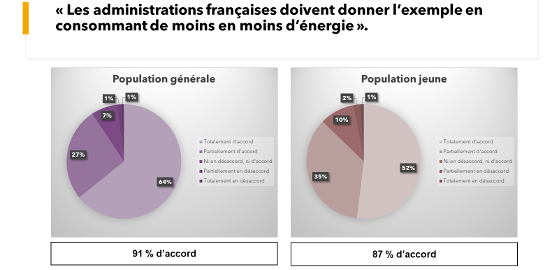
Do young people always agree with each other on environmental issues?
During our survey, we met young people aged 15-24 engaged in ecology, but also young people, from the same age group, who refute, put into perspective or doubt the importance of the environmental crisis.
Do young people, declaring themselves committed to the environment and those who refute it, put into perspective or doubt the importance of climate change, always disagree?
YES
Indeed! Our survey results show that young environmentalists and their opponents sometimes hold quite similar views. For example, they express concern about the future of our planet in terms of pollution of soils, oceans and biodiversity. Their disagreements are more about the importance given to the climate crisis, the measures to be put in place and the role of Man in global warming.
NO
Our study showed otherwise! Our survey results show that young environmentalists and their opponents sometimes hold quite similar views. For example, they express concern about the future of our planet in terms of pollution of soils, oceans and biodiversity. Their disagreements are more about the importance given to the climate crisis, the measures to be put in place and the role of Man in global warming.
When young activists and young people doubting the importance of global warming have the same ideas…
The young people we met for our survey enabled us to identify three general ideas on which the majority of them all agree.
1. The current state of the planet is bad
In our survey, a negative perception of the current state of the planet is widely shared by all the eco-engaged young people we met, but also by those young people who doubt, refute or put into perspective human responsibility towards global warming.
Read the words of Victor, 16, who declares himself to be a climate change sceptic.
Q: Well, in general, can you explain to me what you think of the current state of our planet?
A: “Hmm well I see that obviously it’s not, it’s not great. Already locally with the, how, the… the heat waves every summer, the rather extreme climatic episodes from time to time, and recently the frosts. And then even on a global level I see all the problems caused by drought, etc.” .
Q: And do you think we will face great difficulties in the years to come?
A: Hmm! Yes probably, especially in terms of plastic pollution of the oceans, of the soil. And also the greatest difficulty will be, well, to change our way of living and of producing industrially.”
2. Action is needed at all levels to protect the environment
Faced with the current state of the planet, our respondents partly agree with the feeling that it is important to act to preserve the environment. Action is, for many, needed on individual, corporate and governmental levels.
I. Eco-gestures
What place do eco-responsible actions occupy in your daily life? What do you think of their impact in the fight against climate change?
The results of our quantitative survey show that eco-gestures are considered important by the French since 79% of the general population and 72% of 15-24 year olds agree with the statement “Adopting eco-responsible behaviours is important to me”.
The COVID-19 health crisis has led to the strengthening of eco-gestures as 68% of the French population totally or partially agree with the statement “The health crisis encourages me to adopt a lifestyle that is even more respectful of the environment”.
Despite the importance given to these eco-gestures, our respondents believe, for the most part, that these actions are not enough. Actions in favour of the protection/preservation of the environment must, be carried out, more often, by institutions than by individuals, as Marie explains:
Read the words of Marie, 18, who declares herself to be eco-engaged.
“[…] eco-gestures, etc., that’s good, but it’s not just that that can change things. But I think it’s already better than what the government and the companies are doing because at least the citizens are doing something and they are trying for their part, even if it’s a bit of a helpless way of doing something because we know very well that it will not change everything, but I think its a good start. […] At Youth For Climate, for example, we try to use civil disobedience, by protesting, by being a part of local struggles, etc., and I already find that a little better. But, we know that we are trying to do a lot of things and that we are not having a huge impact because companies and the government have the power to change things completely.”
II. Corporate and government actions
What do you think of the actions carried out by companies and the French government?
Our eco-engaged respondents consider eco-responsible gestures important but insist on the crucial nature of the actions carried out by political powers and companies which still remain, in their eyes, too timid, insufficient or even non-existent. This is largely visible through the dissatisfaction and the very virulent criticisms that they formulate against these institutions and those who embody them. What transpires through the words of these young people are expectations of consistency between the speeches of the men and women who represent the institutions and their actions on environmental and climate issues.
Some statistics…
For example, our quantitative results show that 91% of French people and 87% of young people aged 15-24, believe that the country’s administrations should set the example with their energy consumption.

And at what scale do you think green actions are most important: on an individual level? Corporate? Governmental?
Whether you are an activist or not, have you ever disagreed with the ideas or actions of certain members of an environmental movement?
When young activists disagree with each other.
The results of our survey clearly show that disagreements exist within the environmental movements themselves. Some of our respondents do indeed express disagreements and sometimes even conflicts between members of the same movement.
We were able to identify two subjects that seem to be a source of disagreement between activists:
1. The intensity of opinions as a possible source of conflict
To verify the intensity of beliefs, we asked the French about their relationship to radical ideas concerning ecology, in particular by asking them if it is justified to use physical violence in the defence/protection of the environment.
Read more…
The results of the study show that, in general, the French disagree with this idea (only 17% of the French population agrees and 25% of young people aged 15-24). The qualitative survey also shows that within the same movement, eco-engaged activists can experience conflicts regarding disagreements on certain ideas which may seem extreme to some, even if they appear to be adapted to the crisis situation to others.
Have you ever had a similar experience?
2. The intensity of actions as a source of division within the movement
We also surveyed the French on the intensity of actions through the idea of committing an offence or crime in the name of defending the environment. The observation is that the trends confirm those relating to the idea that “physical violence is sometimes justified”.
Read more…
Our results show that only 17% of all French people and 30% of young people aged 15-24 agree, for instance, with tortious and criminal actions in the name of environmental protection. Even if some French people believe that the ecological cause is worth increasing the intensity of the combat actions, the vast majority of the populations find them extreme. The qualitative survey showed that activists are often divided not only on opinions but also on the types of actions to be implemented within the framework of the ecological fight.
For further information
- Guillemot, H. (2014). Les désaccords sur le changement climatique en France : au-delà d’un climat bipolaire. Natures Sciences Sociétés, 22, 340-350. Online here
- Lalanne, M. & Lapeyre, N. (2009). L’engagement écologique au quotidien a-t-il un genre ? Recherches féministes, 22(1), 47–68. Online here
